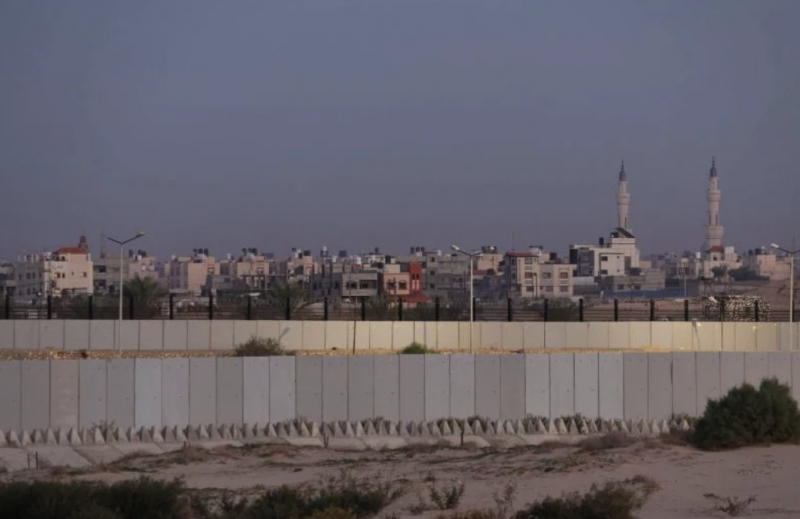
The wall on Egypt's eastern border with the Gaza Strip, at Rafah, Dec. 11, 2023. (Credit: Giuseppe Cacace/AFP)
Tension continues to mount between Egypt and Israel on the Philadelphi corridor, at the far south of the Gaza Strip. It ratcheted up on Monday night when fire exchanges broke out near the al-Awja crossing point, known in Israel as Nitzana, an Egyptian army spokesperson said on Tuesday. The spokesperson added that his country had foiled a drug trafficking attempt.
One person was killed and six traffickers were arrested in this area, where humanitarian aid lorries bound for the Palestinian enclave are inspected, according to Reuters.
The Israeli army’s Arabic-speaking spokesperson, Avichay Adraee, wrote on X (formerly Twitter) that “around 20 suspects, including a number of armed men, arrived from Egyptian territory in the border area near Nitzana, where soldiers working in the area opened fire and recorded several people injured.”
An Israeli official also said that the suspects were probably trying to smuggle drugs, Reuters reported.
Smuggling of all kinds is rife in the Sinai Peninsula and regularly crosses the Philadelphi Corridor, a line of sand under Egyptian control that runs for 14 kilometers along the southern border of the Gaza Strip.
But security incidents between Egypt and Israel in this area are rare, and the one that took place on Monday evening is somewhat hazy.
According to The New Arab, an Egyptian military source refuted the official account on the drug trafficking, claiming that it was an infiltration attempt by fighters to support the Palestinians in Gaza.
According to the same source, the men took the same route as Egyptian conscript Mohammad Salah, who was killed in a similar exchange of fire last June. The Sinai Peninsula remains an area of jihadist activity, which Cairo has been trying to combat for a decade.
Key crossing point
The incident occurred at a time when Tel Aviv has been speaking loud and clear for more than a month its intention to dominate this corridor, the only part of the border with Gaza that is still not fully under the Israeli army’s control. The border zone has once again become a strategic issue for Israel.
In addition to arms trafficking networks control, Israel hopes to take advantage of the war in the Palestinian enclave to renew its presence at this key crossing point, which would enable it to complete its project.
“We will destroy Hamas, we will demilitarize Gaza, and military equipment and other deadly weapons will continue to enter this south opening, so of course we need to close it,” said Benjamin Netanyahu on Saturday in a rare press conference.
“It is clear that any other arrangement [other than the Israeli army’s control of the corridor and its closure] will not guarantee the disarmament that we want,” he had said in late December.
According to the Israeli scenario, Israel intends to eliminate Hamas’s presence and take control of the Rafah border crossing on the Gaza side, including if a “reformed” Palestinian entity took charge of civil affairs in the enclave.
Cairo fears that its sovereignty over this buffer zone, initially established under the 1979 peace treaty with Israel, will be called into question. The aim was to prevent trade in arms and goods between Egypt and Gaza. But Israel ceded control of the corridor to its Egyptian neighbor and the Palestinian authorities only after its unilateral withdrawal from the enclave in 2005.
“These issues [such as the Philadelphi Corridor] are subject to legal agreements ... and Egypt will respond to comments accordingly,” said Ahmad Abou Zeid, spokesperson for the Egyptian Foreign Ministry on Saturday, in response to Netanyahu’s remarks.
On the same day, the Wall Street Journal quoted Israeli officials saying that Tel Aviv informed Cairo of its plans to control the Gaza border with Egypt, which would involve stationing Israeli security personnel on the Egyptian side of the border to conduct joint patrols with Egypt.
Israel also asked for sensors to be installed along the Philadelphi corridor, in order to be alerted by the Egyptian authorities if new tunnel networks are discovered.
Three senior Egyptian officials told Reuters on Jan.9 that Egypt had rejected the Israeli proposal that would deprive Cairo of a key lever in Gaza.
“Egypt has never crossed the border and is defending its borders and territory. The Egyptian Army has the necessary forces and capabilities to defend Egypt and its national security,” said President Abdel Fattah al-Sisi recently, in response to Israel’s plan to take control of the Rafah border crossing, which is on the corridor.
Cooperation on intelligence matters, which would involve sending Israeli surveillance drones into the area in the event of an alert, has also so far been rejected by Egypt, on the grounds that it would constitute a violation of its sovereignty.
Today, Israel’s efforts to maintain close security cooperation with its neighbor are embarrassing Cairo more than ever.
Faced with the risk of an Israeli military incursion from Egyptian territory, the country fears the forced displacement of its population towards Sinai, while more than a million Palestinian civilians are concentrated in the border zone after fleeing Israeli invasion of the northern Gaza Strip.
This article was originally published in L'Orient-Le Jour. Translated by Joelle El Khoury.